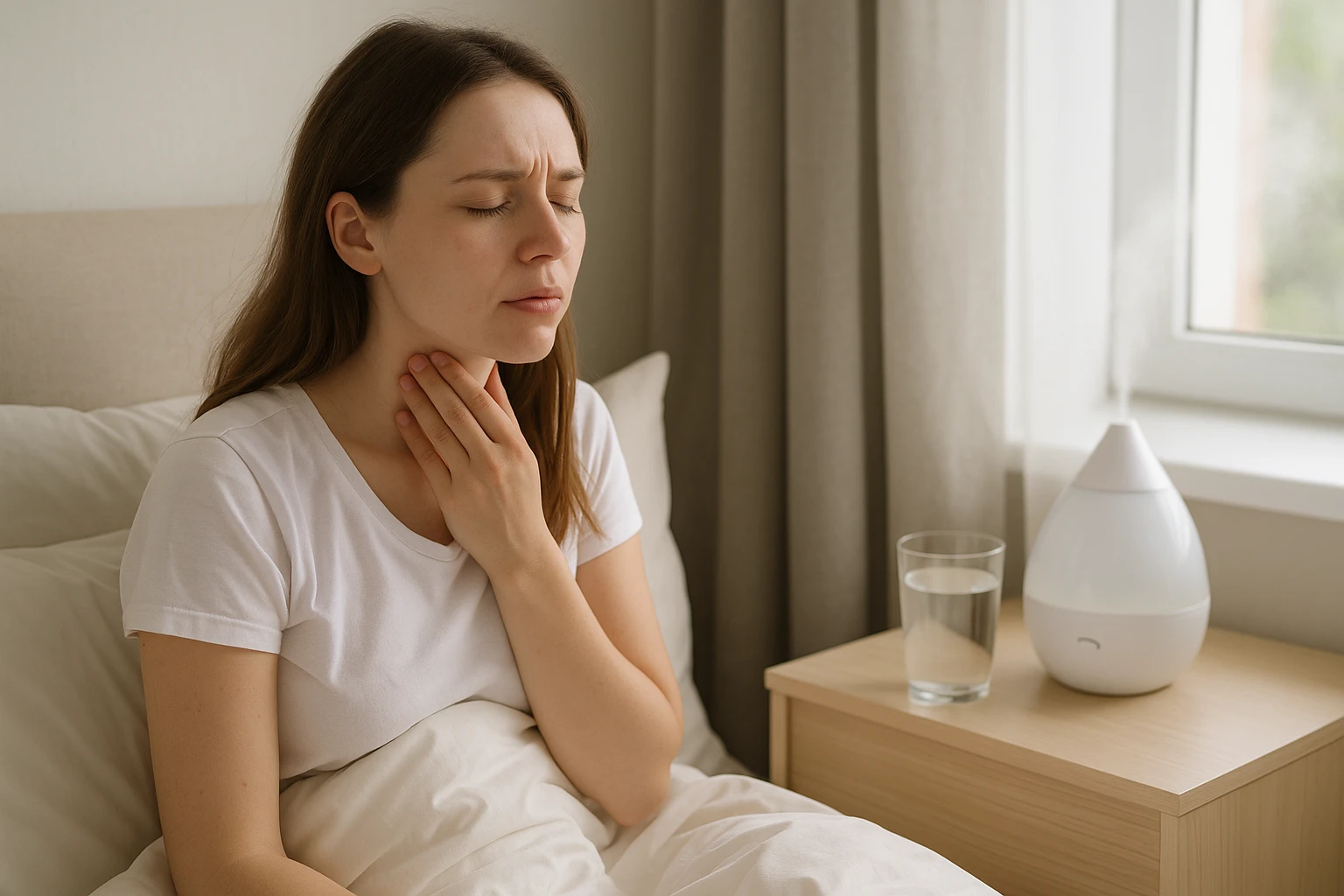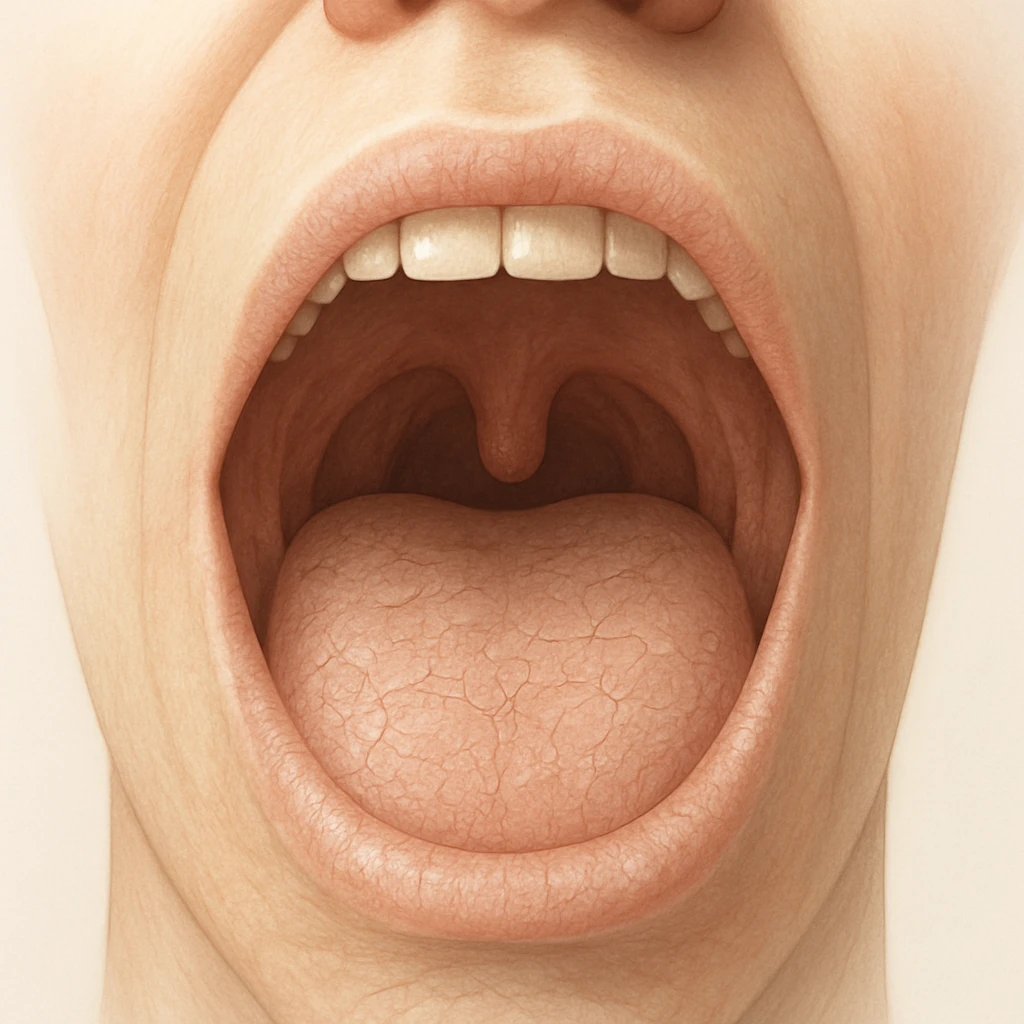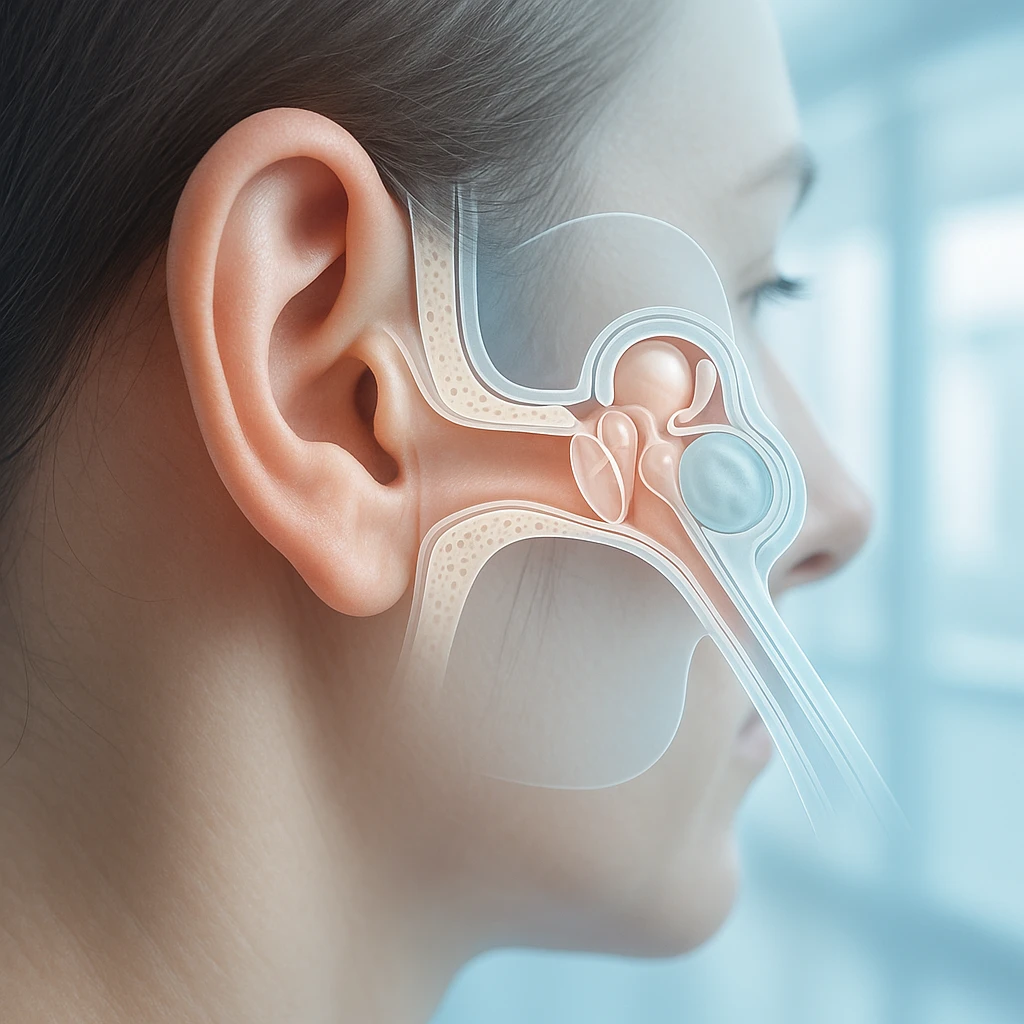Why You Wake Up With a Sore Throat in the Morning
Why Your Throat Feels Sore in the Morning
A common but fixable morning complaint
Many people experience a sore throat in the morning, often described as scratchy or dry. This is usually not a sign of infection but a result of the sleep environment. When bedroom air is dry-especially in winter or when heating or fans run overnight-the delicate lining of the throat can lose moisture. This dryness leaves tissues irritated and sensitive by morning, usually improving once you drink water or move around.
Sleeping with your mouth open has a similar effect. Mouth-breathing bypasses the nose’s natural humidifying system, allowing airflow to dry the throat throughout the night. The result is a parched, irritated feeling on waking that typically fades after rehydration.
- Dry indoor air or fans can remove moisture from throat tissues overnight.
- Mouth-breathing during sleep increases dryness and irritation.
- Symptoms of a sore throat in the morning usually improve after hydration or once you start the day.
Morning-only vs. all-day soreness
A brief sore throat that eases within an hour of waking is commonly caused by overnight dryness or mouth-breathing. Snoring or sleep apnea can make this irritation worse, as vibrations and repeated airflow through the mouth further dry and inflame throat tissues. When this pattern happens regularly, it may be a sign that sleep quality or breathing patterns need attention.
However, if the soreness lasts all day or is joined by symptoms such as fever, swollen glands, or pain when swallowing, an infection or another medical condition may be responsible. Recognizing the difference helps you know when simple adjustments-like adding humidity or addressing mouth-breathing-are enough, and when to contact a healthcare provider.
Everyday Triggers That Irritate Your Throat Overnight
Dry air and dehydration
When the air in your room is too dry, moisture evaporates more quickly from the lining of your throat. This occurs most often in colder months when heating systems are running or when a fan blows directly toward you at night. The throat’s mucous membranes can become dehydrated, leading to a scratchy or sore feeling when you wake up. Dehydration during the day-such as not drinking enough water-can make this dryness worse overnight.
- Dry air from heaters or fans increases moisture loss from the throat.
- Low daily fluid intake can worsen overnight dehydration.
- Adding humidity or staying hydrated helps keep throat tissues moist.
Mouth-breathing and nasal blockage
Breathing through the mouth while asleep is a common cause of a sore throat in the morning. When air bypasses the nose’s natural filtering and humidifying system, the throat loses moisture and becomes irritated. Mouth-breathing is more likely when nasal passages are blocked from congestion, colds, or allergies.
People who snore or have sleep apnea may experience more throat irritation due to repeated vibrations and airflow through the mouth. These effects can lead to waking with dryness or soreness that typically improves once you rehydrate or start speaking.
- Mouth-breathing dries and irritates the throat during sleep.
- Nasal congestion from allergies or colds often triggers mouth-breathing.
- Snoring or sleep apnea can worsen morning throat irritation.
Reflux and allergies at night
When you lie flat, stomach acid can travel upward toward the throat, especially in people who experience reflux. This backflow of acid irritates the throat and can cause discomfort upon waking. The irritation is often mild but may persist if reflux occurs frequently during sleep. Elevating the head slightly or avoiding heavy meals close to bedtime can sometimes reduce this overnight irritation.
Allergies can also play a role. When the body reacts to allergens like dust or pet dander, mucus drains from the nose into the throat while you sleep-a process called postnasal drip. This constant flow of mucus can make the throat feel scratchy or sore by morning, particularly in people with seasonal or indoor allergies.
- Lying flat can allow acid reflux to reach the throat overnight.
- Postnasal drip from allergies leads to morning throat irritation.
- Allergens such as dust or pet dander commonly worsen overnight symptoms.
When Infection or Other Conditions Are the Cause
Viral and bacterial infections
While many cases of a sore throat in the morning stem from dryness or environmental factors, infections can also be to blame. Viral infections are the most common cause of sore throats overall, including colds, flu, and other upper respiratory infections. Symptoms often develop gradually and may include nasal congestion, cough, or body aches. Most viral sore throats clear on their own within several days as the body recovers.
- Viral infections: usually mild, gradual onset, may include cold or flu symptoms.
- Bacterial infections: less common, often cause sudden and severe throat pain with fever.
- Strep throat: a key bacterial infection that requires medical treatment.
Bacterial infections are less common but tend to cause more intense or prolonged throat pain. One well-known example is strep throat, caused by group A Streptococcus bacteria. This infection often appears suddenly with severe throat pain, fever, and swollen lymph nodes, usually without nasal symptoms. Because bacterial infections do not resolve on their own, they require evaluation and targeted antibiotic treatment to prevent complications.
Chronic and structural causes
When throat soreness recurs frequently or lasts beyond a week, other underlying conditions may be involved. One possible cause is tonsil stones-small, hardened deposits that form in the folds of the tonsils. These stones can irritate nearby tissue, leading to a persistent scratchy feeling or bad breath. They may come and go but sometimes require medical removal if they cause ongoing discomfort.
- Tonsil stones: small deposits that may cause recurring irritation or bad breath.
- Chronic reflux: stomach acid reaching the throat can cause ongoing soreness.
- Sinus drainage or allergies: postnasal drip may keep the throat mildly irritated.
Chronic irritation can also result from ongoing reflux, in which stomach acid travels upward toward the throat, or from repeated exposure to mucus drainage due to sinus or allergy issues. These conditions tend to cause dull, lingering irritation rather than the sharp pain typical of infection. Identifying and addressing the cause-such as reflux control or allergy management-can help reduce these recurring morning symptoms.
When to Seek Medical Help
When symptoms mean more than dryness
Most cases of a sore throat in the morning are mild and short-lived, often caused by dry air, mouth-breathing, or minor irritation. However, certain symptoms suggest that something more serious may be occurring. Knowing when to seek medical help can prevent complications and ensure proper treatment if an infection or another condition is present.
These warning signs may indicate a bacterial infection, such as strep throat, or a more persistent issue that needs medical evaluation. Persistent throat pain with neck swelling, hoarseness, or weight loss could point to a condition requiring specialist assessment. While most throat pain resolves on its own, it’s important to take new or worsening symptoms seriously-especially if they interfere with eating, sleeping, or breathing comfortably.
If your sore throat in the morning becomes worse over several days or is accompanied by concerning symptoms, it’s worth getting checked. Early care can often mean faster recovery and peace of mind.
Simple Relief and Prevention Tips for a Sore Throat in the Morning
Hydrate and humidify
Keeping your throat and the air around you moist is one of the easiest ways to prevent morning irritation. Drinking enough water throughout the day helps the throat’s delicate tissues stay hydrated and function properly. Before bed, a glass of water can offset the natural dryness that develops overnight and help reduce the chance of waking with a sore throat in the morning.
- Drink water regularly throughout the day to keep the throat moist.
- Use a cool-mist humidifier to add moisture to dry indoor air.
- Adjust your environment by moving fans away or opening a window slightly.
Avoid triggers and support nasal breathing
Reducing exposure to irritants such as cigarette smoke, dust, and allergens can prevent repeated throat irritation. Keeping your sleeping area clean and using an air purifier may help limit exposure to airborne particles. For people who struggle with nasal congestion, saline sprays or gentle rinses can make it easier to breathe through the nose rather than the mouth overnight.
- Keep the bedroom free from dust and allergens.
- Use nasal saline rinses to relieve congestion.
- Practice nasal breathing and adjust sleep position to reduce mouth-breathing.
Managing reflux and snoring long-term
Some throat irritation stems from reflux or snoring, both of which can be improved with a few long-term changes. Avoiding heavy meals and lying down immediately after eating can lessen acid reflux during the night. Elevating the head of the bed slightly can also prevent stomach acid from reaching the throat while you sleep, reducing the likelihood of soreness in the morning.
- Avoid eating large or late meals before bedtime.
- Raise the head of the bed slightly to minimize reflux during sleep.
- Seek evaluation if reflux, snoring, or mouth-breathing continues despite lifestyle changes.
If snoring, mouth-breathing, or reflux continues despite lifestyle adjustments, it may be worth discussing with a healthcare professional. Addressing these issues not only helps relieve morning soreness but also improves sleep quality and overall comfort.
Frequently Asked Questions About a Sore Throat in the Morning
- Why does my throat feel sore only when I wake up?
- This usually happens because of dry air, mouth-breathing, or dehydration overnight. These factors dry the throat lining, making it feel irritated until you drink water.
- Can sleeping with my mouth open really cause a sore throat?
- Yes. Mouth-breathing bypasses the nose’s natural humidifying function, allowing air to dry the throat and cause morning soreness.
- Is it normal for a sore throat in the morning to go away after a few hours?
- It’s common. If soreness fades soon after waking and doesn’t return later in the day, it’s often due to temporary dryness rather than infection.
- Could acid reflux be behind my morning throat pain?
- Yes. When you lie flat, stomach acid can rise into the throat during sleep, leading to irritation and soreness by morning.
- How do allergies make my throat sore when I wake up?
- Allergens like dust or pet dander can trigger postnasal drip overnight. Mucus draining into the throat may cause inflammation and a scratchy feeling.
- When should I see a doctor about morning throat pain?
- If the pain lasts all day, worsens over several days, or includes fever, swelling, or difficulty swallowing, it’s best to seek medical evaluation.
- Can snoring or sleep apnea cause a sore throat in the morning?
- Yes. Snoring and sleep apnea cause repeated airflow and vibration through the mouth, which can dry and irritate throat tissues overnight.
- Why does my sore throat keep coming back each morning?
- Recurring morning soreness may stem from reflux, allergies, or even tonsil stones. Identifying and managing the cause can help prevent frequent irritation.
- What helps prevent a sore throat in the morning?
- Staying hydrated, using a humidifier, and maintaining clean air in your bedroom reduce throat dryness. Addressing nasal congestion and reflux can also help.
- Is a sore throat in the morning ever a sign of infection?
- Sometimes. Viral or bacterial infections can cause more persistent throat pain that lasts beyond morning and may require medical care.













